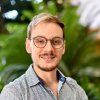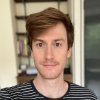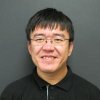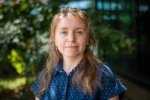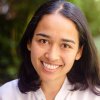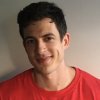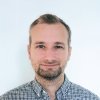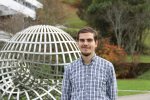Hooke and Titchmarsh Fellowships
Here at the Mathematical Institute, we are keen to support promising researchers who wish to start, or continue, their academic careers here at Oxford. Our three-year Hooke and Titchmarsh Fellowships offer individuals the chance to pursue their own research programme at our world-leading department.
Many of our Fellows have proceeded to take up permanent faculty positions at leading institutions around the world. In the table below, you can find some short profiles from some of our current and previous Hooke and Titchmarsh Research Fellows, explaining why they were encouraged to apply for the Fellowship, their experience of life at Oxford and, for our alumni, the positions that they held after taking up the Fellowship.
Alex Browning Hooke Fellow
| It’s very likely I came out of my PhD with more open questions than answers. As a mathematical biologist, what struck me most was that the tools to answer these questions didn’t lie in the expertise of any one researcher, or even any one field. I applied for a Hooke Fellowship not only in the hope of allowing me to conduct research to find some of these answers, but also in the hope of an opportunity to draw on the diversity of expertise in the Mathematical Institute, and, indeed, the University of Oxford more broadly. Even the process of applying for the fellowship, before I was interviewed or even shortlisted, was a valuable opportunity to develop a vision for my research, and identify the skills that I would need to develop to answer the questions I was most interested in. |
Radu Cimpeanu Hooke Fellow
| Following successful postgraduate and postdoctoral steps at Imperial College London, I was drawn by the opportunity to engage with a highly interdisciplinary group from a position that perfectly balanced responsibilities and resources for the respective stage of my career. Previous interactions with OCIAM, the InFoMM CDT, as well as several fantastic colleagues at the institute have made the decision to apply a very natural one. The Fellowship was instrumental in allowing me to gain independence and not only further my initial research agenda, but also create new links, in particular with groups with experimental capabilities in Oxford, nationally and internationally (with US colleagues in particular). The environment was highly supportive in advice for early funding routes for these intiatives. Valuable teaching experience (in colleges and in department), as well as wider activities in the department (with the Early Career Researchers Committee in particular), have further shaped my experience and vision for creating a new group in my area. Once I entered the second year of my Hooke Fellowship, I started applying for permanent academic posts and was successful in securing an assistant professorship at the Warwick Mathematics Institute starting in September 2019. I have since been promoted to Associate Professor in Applied Mathematics in 2022. Due to ongoing research and supervision activities, I have retained affiliations with the Oxford Mathematical Institute as OCIAM Visiting Fellow and the Department of Mathematics at Imperial College London as Honorary Lecturer. |
Pierre Haas Hooke Fellow Image: (C) Katrin Boes / MPI-CBG | My main reason for applying was the strength of the Mathematical Institute and OCIAM in particular in solid mechanics (e.g. Alain Goriely, Dominic Vella), combined with the mathematical biophysics research within OCIAM and the Wolfson Centre for Mathematical Biology. Because of this, I thought that the Mathematical Institute would be great place to build collaborations and develop my independent research programme as a Hooke Fellow. During my brief time in Oxford, I was working on a problem of Turing patterns, and I had good (online) discussions with Philip Maini and, in particular, Andrew Krause. Since leaving Oxford, I have held a position as Max Planck Research Group Leader "Self-Organisation of Multicellular Systems" at the Max Planck Institute for the Physics of Complex Systems and the Max Planck Institute of Molecular Cell Biology and Genetics in Dresden (Germany). |
Matthew Hennessy Hooke Fellow
| The Hooke Fellowship stood out as the ideal way to boost my research trajectory. I was drawn to the opportunity to develop my own research agenda in a highly collaborative and world-leading research environment. The intellectual freedom during the fellowship allowed me to explore new topics, refine my research focus, and expand my portfolio of projects. Much of my research is either driven by or inspired by work that got off the ground while at Oxford. During the fellowship, I also gained useful experience in supervising students, organising events, and taking on administrative roles. The skills that I acquired undoubtedly helped in securing a permanent academic position, which was a long-standing ambition of mine. During the fellowship, I was appointed as a Lecturer in Engineering Mathematics at the University of Bristol, a position that I currently hold. |
Kaibo Hu Hooke Fellow
| When I applied for the Fellowship, I wanted to expand my research profile beyond my existing topics and gain some independence. The Hooke Research Fellowship is an excellent post for this, as the Mathematical Institute has strengths in many areas. Overall the experience was fantastic. I enjoyed working with colleagues and students at the Mathematical Institute, who are all talented and friendly. The academic environment is very active - often, many seminars and meetings are going on, and many visitors are around. Associated with the Mathematical Institute, I had a chance to apply for a college affiliation, and I was lucky to get one. College life provides a unique experience and a chance to meet people from other disciplines. During the Fellowship, I got a Royal Society University Research Fellowship and will start the new post in October at the Mathematical Institute. I got a lot of support from colleagues at the Mathematical Institute in proposal writing and mock interview, which was very important for the application. |
Anna Seigal
| I applied for the Hooke Research Fellowship because I was enthusiastic about the research environment at the Mathematical Institute and the many possibilities for collaboration there. I am now a Junior Fellow at the Society of Fellows and an incoming Assistant Professor of Applied Mathematics at Harvard University. The Hooke Research Fellowship led to fruitful collaborations and helped me to develop my independence as a researcher. I greatly enjoyed working with colleagues and students at Oxford. |
Melanie Weber
| I was encouraged to apply for a Hooke Research Fellowship due to the excellent research environment at the Mathematical Institute and the opportunity to pursue independent research. Following my Fellowship, I took up a tenure-track position at Harvard University (Assistant Professor of Applied Mathematics and Computer Science). My current website with information on my research and career path is here: http://melanie-weber.com/ |
Jennifer Balakrishnan Titchmarsh Fellow
| Minhyong Kim, a mentor of mine and, at the time, Professor at the Mathematical Institute, encouraged me to apply for a Titchmarsh Fellowship. The Titchmarsh Fellowship gave me the opportunity to work with Minhyong and his DPhil students, and the collaborations we started at Oxford continue to this day. I also appreciated the chance to supervise Part C and MSc dissertations and started supervising my first DPhil student (jointly with Alan Lauder). After the Titchmarsh Fellowship, I began a position at Boston University, first as the Clare Boothe Luce Assistant Professor (2016 -- 2021) and now as the Clare Boothe Luce Associate Professor (2021 -- present). |
Benjamin Fehrman
| My research is broadly in stochastic analysis. The strength of the research group at Oxford as well as the substantial number of UK-based researchers in this area were two of the primary reasons why I decided to apply for a Titchmarsh Fellowship. In my third year at Oxford, I was awarded an EPSRC Early Career Fellowship and, in the Fall of 2023, I will begin as an Assistant Professor at Louisiana State University. |
Martin Gallauer | There were several reasons why the Titchmarsh Fellowship was appealing to me. There was the prospect of academic freedom and the possibility to pursue my own research programme. At the same time I knew I would be part of an excellent department with a wide range of activities and many visitors. Having lived for several years in a big city in the US, I was also looking forward to a change of scenery, to spend some time in the historic and lively village-town that Oxford is. While the pandemic had an effect on department life as well, most of my expectations were met and I very much enjoyed the three years as a fellow. I found the faculty to be most welcoming. And it was great supervising students and teaching in a variety of contexts, within the department and at colleges. Upon completing my tenure I was a guest at the MPI in Bonn and am now about to start as an assistant professor in Warwick. Without a period as productive as the one in Oxford my subsequent journey might look different indeed. |
Fabian Haiden
| What attracted me to the Titchmarsh Research Fellowship is the opportunity to conduct my own research while embedded in the exceptional Oxford maths community. I already knew several of the professors at the Mathematical Institute, and that their research interest would overlap with mine. After my Titchmarsh position in Oxford I moved to an assistant professor position at the University of Southern Denmark’s Centre for Quantum Mathematics, where I’m currently based. I’m very happy with this position and the Fellowship played an important part in preparing me for it. My experience in Oxford has been a very positive one. Shortly after my arrival, we organized an informal seminar about my previous work and its relation to the work of other members of the geometry group, so I never felt isolated, even during covid. The position offers many possibilities for career development, such as teaching advanced courses, supervising thesis projects, organizing seminars, and other committee work. Coming from a postdoc in the US, I found the teaching duties significantly lighter, and they involved mainly college tutorial teaching in small groups. |
Priya Subramanian
| Since 2015, I was working as a post-doc in UK and I wanted to pursue an independent research position. I saw the Hooke Fellowship as an opportunity to achieve that and to work with other researchers committed to research excellence. That being said, my first application to a round of call for Hooke Fellowships was not shortlisted. Being a newcomer to Oxford, this result would have given me pause to apply again. However, the email informing of this outcome also said that my research area was not the focus of that round of selections and urged me to apply again. Such a non-standard feedback and comment in the rejection email gave me much needed support and optimism to apply again for my second and successful Hooke Fellowship application. Firstly, my time as a Hooke Fellow allowed me to focus fully on research and be part of a very dynamic academic community. Common room conversations and North-meets-South seminars have really made me confident to engage across intradisciplinary boundaries and learn from colleagues that pursue topics in theoretical mathematics. Secondly, I was lucky enough to be a Senior Research Fellow at Somerville during my time as a Hooke fellow and I was very much grateful to be enriched by the dual aspects of college and department. This prepared me to be efficient at handling the dual priorities of research and academic citizenship activities(service & leadership) as an academic. Looking back, being a Hooke Fellow was very much a training-wheels(mentors) included taste of life as an academic! I got the offer of a Senior Lectureship at the University of Auckland in the first year of my Hooke fellowship. Even with Covid-related visa delays, I was able to end my Hooke fellowship a year early and I have been a Senior Lecturer in Applied Mathematics at the University of Auckland since September 2021. |
| I really wanted to apply to Oxford for my postdoc. As a number theorist, I aspired to be a part of the excellent number theory group there. Therefore I applied for several postdoc openings at Oxford, and one of the number theory professors there suggested that I apply for the Titchmarsh Fellowship, and so I did. Being a Titchmarsh Fellow was a big boost for my career. The working environment at the Mathematical Institute was very productive, and there were so many people in my area to talk to and interact with. The travel grant that came with the fellowship enabled me to travel quite a lot to e.g. visit collaborators, which was very helpful for my research. I also got some teaching experience that was useful for my career development. Since completing my fellowship, I have been an Academy of Finland postdoctoral researcher at the University of Turku and a von Neumann Fellow at the Institute of Advanced Study. |
Jinhe Ye
| I obtained my PhD degree at the University of Notre Dame in 2020. I started a postdoc at the Mathematical Sciences Research Institute in Fall 2020, associated to the special program "Definability, Decidability, and Computability in Number Theory”. Since December 2020, I have been a postdoc at Institut de Mathématiques de Jussieu – Paris Rive Gauche. The grant came from Fondation Sciences Mathématiques de Paris. Thanks to the help from my postdoc advisor and the team, I had quite a number of opportunities to attend conferences and visit collaborators, during which I started several new and exciting research projects independently from my advisor. I feel like I am at the transitional stage to take up more independent research in my career, and the Titchmarsh Research Fellowship is an ideal fit for this purpose. Not only will I be able to conduct research on my own, the senior members of the Mathematical Institute will be able to offer valuable insights and advices for my career progression, both scientifically and professionally. |
| It was a great honour to have been a Titchmarsh fellow at Oxford with the OxPDE group. The supportive and open environment was very conducive to high quality research. I got the fabulous opportunity to interact with top mathematicians in the UK and in Europe. It was a wonderful experience overall, that paved the way to my subsequent long-term appointments at the Chinese University of Hong Kong and at the Australian National University. |


